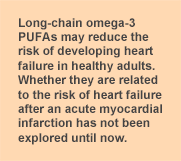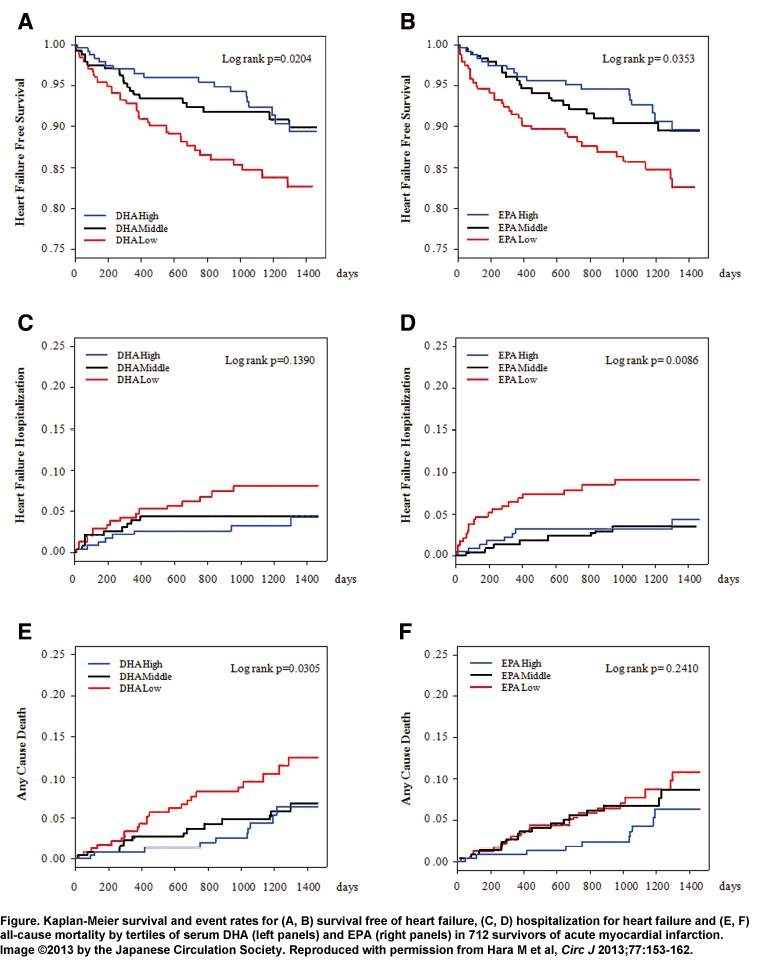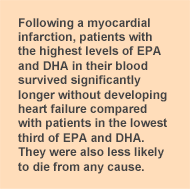
As evidence accumulates that n-3 LC-PUFAs may reduce the risk of developing heart failure, investigators in Japan were curious whether n-3 LC-PUFA levels might be related to the occurrence of heart failure after an acute myocardial infarction. Existing cardiovascular disease is associated with a higher risk of developing heart failure. The researchers recruited 712 participants from those enrolled in the Osaka Acute Coronary Insufficiency Study, a multicenter prospective study on patients with an acute myocardial infarction. The study was designed to determine whether serum n-3 LC-PUFA levels were associated with how long patients remained free from heart failure after their infarction. Participants in the study were mostly male (78%), 65 years of age on average, likely to have hypertension (67%) and smoke (63%). Approximately 10% of participants had a previous myocardial infarction. Blood samples were taken within 10 days of the onset of myocardial infarction to avoid the effects of acute phase responses and 3, 6 and 12 months thereafter. The investigators monitored the participants for 5 years. The primary outcome was duration of survival without heart failure, with hospitalization for heart failure and all-cause mortality as secondary outcomes. Patients were grouped according to baseline tertiles of serum EPA and DHA concentrations. The DHA tertiles were: low, ≤ 61.4 μg/mL; intermediate, 61.5 to 83.5 μg/mL; high, > 83.5 μg/mL. Corresponding tertiles for EPA were: low, ≤ 24.6; intermediate, 24.7 to 38.8 μg/mL; high, > 38.8 μg/mL.


As shown in the Figure, survival rates free from heart failure were significantly greater for patients in the highest 2 tertiles of either EPA or DHA compared with those in the lowest tertile. Risk of hospitalization for heart failure was also greatest in patients in the lowest EPA tertile, but all-cause mortality was highest for those in the lowest DHA tertile. These findings for heart failure support those of one other study that reported a significantly
lower risk of incident heart failure in adults without heart disease who had the highest levels of plasma phospholipid EPA. In that study, low DHA levels were not associated with the risk of heart failure. Taken together, these studies demonstrate a benefit of n-3 LC-PUFAs on the outcomes of heart failure following myocardial infarction. In addition, another study reported improvements in
ejection fraction in hart failure patients with higher levels of n-3 LC-PUFAs. As shown in the current study, EPA in particular may benefit those at risk of heart failure for any reason or because of a myocardial infarction. A reduced risk of heart failure was observed in myocardial infarction survivors with plasma EPA levels of at least 24.7 μg/mL. Low DHA levels were associated with a higher risk of all-cause death. Thus, higher rather than lower levels of EPA and DHA may be beneficial in reducing the risk of heart failure, hospitalization for heart failure and death from any cause in patients who have incurred an acute myocardial infarction. Hara M, Sakata Y, Nakatani D, Suna S, Usami M, Matsumoto S, Hamasaki T, Doi Y, Nishino M, Sato H, Kitamura T, Nanto S, Hori M, Komuro I; Osaka Acute Coronary Insufficiency Study (OACIS) Investigators. Low levels of serum n-3 polyunsaturated fatty acids are associated with worse heart failure-free survival in patients after acute myocardial infarction.
Circ J 2013;77:153-162. [
PubMed] Open Access
Worth Noting Gustafson KM, Carlson SE, Colombo J, Yeh H-W, Shaddy DJ, Li S, Kerling EH. Effects of docosahexaenoic acid supplementation during pregnancy on fetal heart rate and variability: A randomized clinical trial.
Prostaglandins Leukot Essent Fatty Acids 2013; doi:10.1016/j.plefa.2013.01.009 [
PubMed] Kelsall CJ, Hoile SP, Irvine NA, Masoodi M, Torrens C, Lillycrop KA, Calder PC, Clough GF, Hanson MA, Burdge GC. Vascular dysfunction induced in offspring by maternal dietary fat involves altered arterial polyunsaturated fatty acid biosynthesis.
PLoS One 7:e34492. doi:10.1371/journal.pone.0034492. [
PubMed]
Open Access Skilton MR, Raitakari OT, Celermajer DS. High intake of dietary long-chain ω-3 fatty acids is associated with lower blood pressure in children born with low birth weight: NHANES 2003-2008.
Hypertension 2013;61:972-976. [
PubMed]
 As evidence accumulates that n-3 LC-PUFAs may reduce the risk of developing heart failure, investigators in Japan were curious whether n-3 LC-PUFA levels might be related to the occurrence of heart failure after an acute myocardial infarction. Existing cardiovascular disease is associated with a higher risk of developing heart failure. The researchers recruited 712 participants from those enrolled in the Osaka Acute Coronary Insufficiency Study, a multicenter prospective study on patients with an acute myocardial infarction. The study was designed to determine whether serum n-3 LC-PUFA levels were associated with how long patients remained free from heart failure after their infarction. Participants in the study were mostly male (78%), 65 years of age on average, likely to have hypertension (67%) and smoke (63%). Approximately 10% of participants had a previous myocardial infarction. Blood samples were taken within 10 days of the onset of myocardial infarction to avoid the effects of acute phase responses and 3, 6 and 12 months thereafter. The investigators monitored the participants for 5 years. The primary outcome was duration of survival without heart failure, with hospitalization for heart failure and all-cause mortality as secondary outcomes. Patients were grouped according to baseline tertiles of serum EPA and DHA concentrations. The DHA tertiles were: low, ≤ 61.4 μg/mL; intermediate, 61.5 to 83.5 μg/mL; high, > 83.5 μg/mL. Corresponding tertiles for EPA were: low, ≤ 24.6; intermediate, 24.7 to 38.8 μg/mL; high, > 38.8 μg/mL.
As evidence accumulates that n-3 LC-PUFAs may reduce the risk of developing heart failure, investigators in Japan were curious whether n-3 LC-PUFA levels might be related to the occurrence of heart failure after an acute myocardial infarction. Existing cardiovascular disease is associated with a higher risk of developing heart failure. The researchers recruited 712 participants from those enrolled in the Osaka Acute Coronary Insufficiency Study, a multicenter prospective study on patients with an acute myocardial infarction. The study was designed to determine whether serum n-3 LC-PUFA levels were associated with how long patients remained free from heart failure after their infarction. Participants in the study were mostly male (78%), 65 years of age on average, likely to have hypertension (67%) and smoke (63%). Approximately 10% of participants had a previous myocardial infarction. Blood samples were taken within 10 days of the onset of myocardial infarction to avoid the effects of acute phase responses and 3, 6 and 12 months thereafter. The investigators monitored the participants for 5 years. The primary outcome was duration of survival without heart failure, with hospitalization for heart failure and all-cause mortality as secondary outcomes. Patients were grouped according to baseline tertiles of serum EPA and DHA concentrations. The DHA tertiles were: low, ≤ 61.4 μg/mL; intermediate, 61.5 to 83.5 μg/mL; high, > 83.5 μg/mL. Corresponding tertiles for EPA were: low, ≤ 24.6; intermediate, 24.7 to 38.8 μg/mL; high, > 38.8 μg/mL. 
 As shown in the Figure, survival rates free from heart failure were significantly greater for patients in the highest 2 tertiles of either EPA or DHA compared with those in the lowest tertile. Risk of hospitalization for heart failure was also greatest in patients in the lowest EPA tertile, but all-cause mortality was highest for those in the lowest DHA tertile. These findings for heart failure support those of one other study that reported a significantly lower risk of incident heart failure in adults without heart disease who had the highest levels of plasma phospholipid EPA. In that study, low DHA levels were not associated with the risk of heart failure. Taken together, these studies demonstrate a benefit of n-3 LC-PUFAs on the outcomes of heart failure following myocardial infarction. In addition, another study reported improvements in ejection fraction in hart failure patients with higher levels of n-3 LC-PUFAs. As shown in the current study, EPA in particular may benefit those at risk of heart failure for any reason or because of a myocardial infarction. A reduced risk of heart failure was observed in myocardial infarction survivors with plasma EPA levels of at least 24.7 μg/mL. Low DHA levels were associated with a higher risk of all-cause death. Thus, higher rather than lower levels of EPA and DHA may be beneficial in reducing the risk of heart failure, hospitalization for heart failure and death from any cause in patients who have incurred an acute myocardial infarction. Hara M, Sakata Y, Nakatani D, Suna S, Usami M, Matsumoto S, Hamasaki T, Doi Y, Nishino M, Sato H, Kitamura T, Nanto S, Hori M, Komuro I; Osaka Acute Coronary Insufficiency Study (OACIS) Investigators. Low levels of serum n-3 polyunsaturated fatty acids are associated with worse heart failure-free survival in patients after acute myocardial infarction. Circ J 2013;77:153-162. [PubMed] Open Access Worth Noting Gustafson KM, Carlson SE, Colombo J, Yeh H-W, Shaddy DJ, Li S, Kerling EH. Effects of docosahexaenoic acid supplementation during pregnancy on fetal heart rate and variability: A randomized clinical trial. Prostaglandins Leukot Essent Fatty Acids 2013; doi:10.1016/j.plefa.2013.01.009 [PubMed] Kelsall CJ, Hoile SP, Irvine NA, Masoodi M, Torrens C, Lillycrop KA, Calder PC, Clough GF, Hanson MA, Burdge GC. Vascular dysfunction induced in offspring by maternal dietary fat involves altered arterial polyunsaturated fatty acid biosynthesis. PLoS One 7:e34492. doi:10.1371/journal.pone.0034492. [PubMed] Open Access Skilton MR, Raitakari OT, Celermajer DS. High intake of dietary long-chain ω-3 fatty acids is associated with lower blood pressure in children born with low birth weight: NHANES 2003-2008. Hypertension 2013;61:972-976. [PubMed]
As shown in the Figure, survival rates free from heart failure were significantly greater for patients in the highest 2 tertiles of either EPA or DHA compared with those in the lowest tertile. Risk of hospitalization for heart failure was also greatest in patients in the lowest EPA tertile, but all-cause mortality was highest for those in the lowest DHA tertile. These findings for heart failure support those of one other study that reported a significantly lower risk of incident heart failure in adults without heart disease who had the highest levels of plasma phospholipid EPA. In that study, low DHA levels were not associated with the risk of heart failure. Taken together, these studies demonstrate a benefit of n-3 LC-PUFAs on the outcomes of heart failure following myocardial infarction. In addition, another study reported improvements in ejection fraction in hart failure patients with higher levels of n-3 LC-PUFAs. As shown in the current study, EPA in particular may benefit those at risk of heart failure for any reason or because of a myocardial infarction. A reduced risk of heart failure was observed in myocardial infarction survivors with plasma EPA levels of at least 24.7 μg/mL. Low DHA levels were associated with a higher risk of all-cause death. Thus, higher rather than lower levels of EPA and DHA may be beneficial in reducing the risk of heart failure, hospitalization for heart failure and death from any cause in patients who have incurred an acute myocardial infarction. Hara M, Sakata Y, Nakatani D, Suna S, Usami M, Matsumoto S, Hamasaki T, Doi Y, Nishino M, Sato H, Kitamura T, Nanto S, Hori M, Komuro I; Osaka Acute Coronary Insufficiency Study (OACIS) Investigators. Low levels of serum n-3 polyunsaturated fatty acids are associated with worse heart failure-free survival in patients after acute myocardial infarction. Circ J 2013;77:153-162. [PubMed] Open Access Worth Noting Gustafson KM, Carlson SE, Colombo J, Yeh H-W, Shaddy DJ, Li S, Kerling EH. Effects of docosahexaenoic acid supplementation during pregnancy on fetal heart rate and variability: A randomized clinical trial. Prostaglandins Leukot Essent Fatty Acids 2013; doi:10.1016/j.plefa.2013.01.009 [PubMed] Kelsall CJ, Hoile SP, Irvine NA, Masoodi M, Torrens C, Lillycrop KA, Calder PC, Clough GF, Hanson MA, Burdge GC. Vascular dysfunction induced in offspring by maternal dietary fat involves altered arterial polyunsaturated fatty acid biosynthesis. PLoS One 7:e34492. doi:10.1371/journal.pone.0034492. [PubMed] Open Access Skilton MR, Raitakari OT, Celermajer DS. High intake of dietary long-chain ω-3 fatty acids is associated with lower blood pressure in children born with low birth weight: NHANES 2003-2008. Hypertension 2013;61:972-976. [PubMed]

